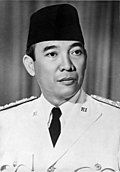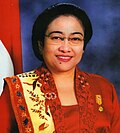This page is based on this
Wikipedia article Text is available under the
CC BY-SA 4.0 license; additional terms may apply.
Images, videos and audio are available under their respective licenses.
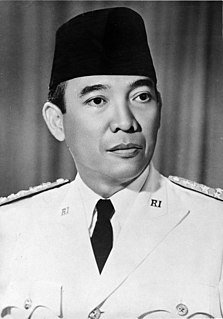
Sukarno was the first President of Indonesia, serving from 1945 to 1967.
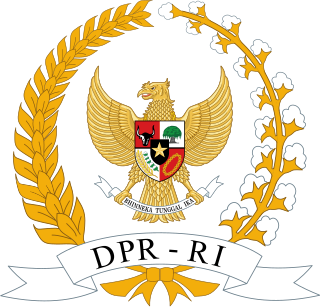
The People's Representative Council, alternatively translatable as the House of Representatives or as the House of People's Representatives, is one of two elected national legislative assemblies in Indonesia.

Mohammad Hatta was Indonesia's first vice president, later also serving as the country's prime minister. Known as "The Proclamator", he and a number of Indonesians, including the first president of Indonesia, Sukarno, fought for the independence of Indonesia from the Dutch. Hatta was born in Fort De Kock, West Sumatra, Dutch East Indies. After his early education, he studied in Dutch schools in the Dutch East Indies and studied in the Netherlands from 1921 until 1932.
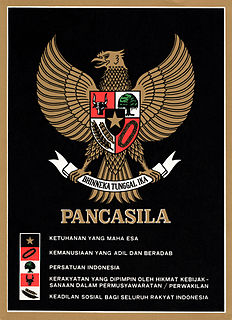
Pancasila is the official, foundational philosophical theory of the Indonesian state. Pancasila comprises two Old Javanese words originally derived from Sanskrit: "pañca" ("five") and "sīla" ("principles"). Thus it is composed of five principles and contends that they are inseparable and interrelated:
- Belief in the One and Only God
(in Indonesian "Ketuhanan Yang Maha Esa"),
- A just and civilized humanity
(in Indonesian "Kemanusiaan Yang Adil dan Beradab"),
- A unified Indonesia
(in Indonesian "Persatuan Indonesia"),
- Democracy, led by the wisdom of the representatives of the People
(in Indonesian "Kerakyatan Yang Dipimpin oleh Hikmat Kebijaksanaan, Dalam Permusyawaratan Perwakilan")
- Social justice for all Indonesians
(in Indonesian "Keadilan Sosial bagi seluruh Rakyat Indonesia").

Adam Malik Batubara was Indonesia's third vice president, a senior diplomat, former foreign minister, and one of the pioneers of Indonesian journalism.
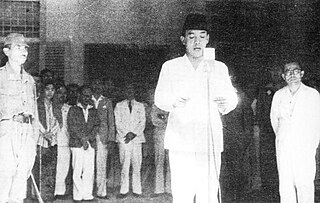
The Proclamation of Indonesian Independence was read at 10:00 a.m. on Friday, 17 August 1945. The declaration marked the start of the diplomatic and armed resistance of the Indonesian National Revolution, fighting against the forces of the Netherlands and pro-Dutch civilians, until the latter officially acknowledged Indonesia's independence in 1949. In 2005, the Netherlands declared that they had decided to accept de facto 17 August 1945 as Indonesia's independence date. On September 14, 2011 a Dutch court ruled in the Rawagede massacre case that the Dutch state was responsible because it has the duty to defend its inhabitants, which also indicated that the area was part of the Dutch East Indies in contradiction of the Indonesian claim of 17 August 1945 as its date of independence. In a 2013 interview the Indonesian historian Sukotjo, amongst others, asked the Dutch government to formally acknowledge the date of independence as 17 August 1945. The United Nations recognizes the date of December 27, 1949.

Hamengkubuwono IX or HB IX; 12 April 1912 – 2 October 1988) was the first Governor of the Special Region of Yogyakarta, the second Vice President of Indonesia and the ninth Sultan of Yogyakarta during the rule of Suharto.

The Merdeka Palace, is one of six presidential palaces in Indonesia. It is located on the north side of the Merdeka Square in Central Jakarta, Indonesia and is used as the official residence of the President of the Republic of Indonesia.

The People's Consultative Assembly of the Republic of Indonesia is the legislative branch in Indonesia's political system. It is composed of the members of the People's Representative Council (DPR) and the Regional Representative Council (DPD). Before 2004, and the amendments to the 1945 Constitution, the MPR was the highest governing body in Indonesia.
The Investigating Committee for Preparatory Work for Independence , sometimes referred to as the Investigating Committee for Preparatory Work for Indonesian Independence, was an organization set up in March 1945 by the Japanese military authority in Java during the Japanese occupation of Indonesia as the initial stage of the establishment of independence for the area under the control of the Japanese 16th Army. The BPUPK held two plenary meetings; the first was from 29 May to 1 June 1945 and the second was between 10 and 17 July 1945.

The Central Indonesian National Committee or KNIP, was a body appointed to assist the president of the newly independent Indonesia. Originally purely advisory, it later gained assumed legislative functions. The Working Committee of the KNIP became part of the People's Representative Council when Indonesia became a unitary state in 1950.

The Presidential Cabinet was the first cabinet established by Indonesia following the 17 August 1945 Indonesian Declaration of Independence. It comprised 20 ministers and four officials. Its term of office ran from 2 September to 14 November 1945.

Soepomo was Indonesia's first Minister of Justice, serving in the Presidential Cabinet from 19 August to 14 November 1945 and from 20 December 1949 to 6 September 1950.

Raden Soelaiman Effendi Koesoemah Atmadja is a National Hero of Indonesia and the first Chairman of its Supreme Court.
The Jakarta Charter was a document drawn up by members of the Indonesian Investigating Committee for Preparatory Work for Independence in June 1945 that subsequently formed the basis of the preamble to the Constitution of Indonesia. It included an obligation for Muslims to abide by Shariah law.




